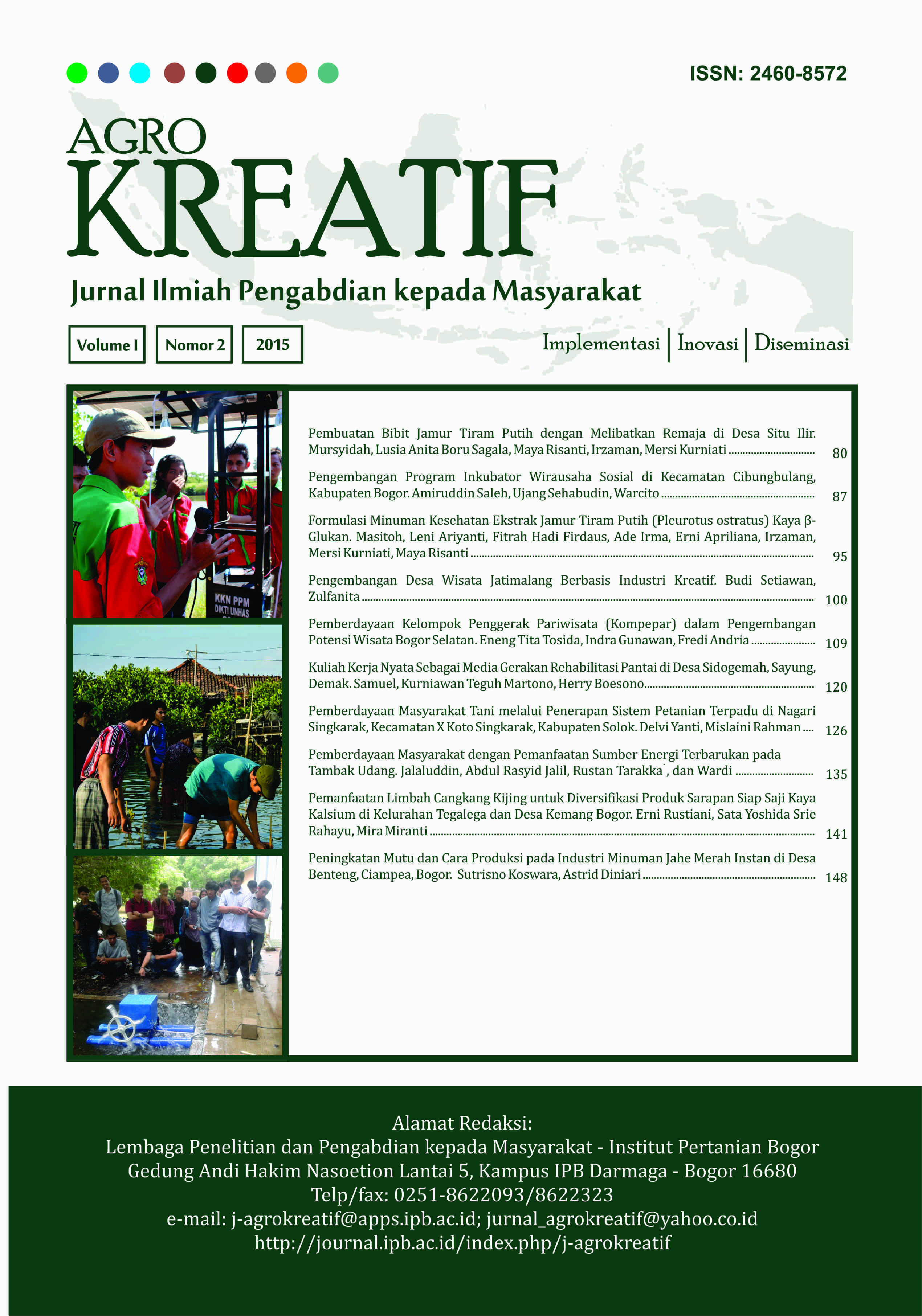Pengembangan Desa Wisata Jatimalang Berbasis Industri Kreatif
Abstract
The purpose of this activity is to develop tourism village Jatimalang to improve community empowerment in the management of tourism potential. Community service activities through the Field Work Experience Learning Community Empowerment (KKN PPM) develop coastal resorts Jatimalang become an attractive tourist destination area and able to empower the local community-based development of creative economy. KKN PPM using the method of Education for Sustainable Development (EfSD) is one method of community service oriented problem solving in the community. EfSD method emphasizes the three pillars, namely economic, ecological or environmental, and social. Program development activities carried out in outline included the development of tourist attractions, accessibility, amenitas, and tourism activities.
Downloads
References
Ashe JW. 2005. Tourism investment as a tool for development and poverty reduction: the experience in Small Island Developing States (SIDS). The Commonwealth Finance Ministers Meeting. Barbados (BB), 18–20 September.
Arifin B. 2007. Diagnosa Ekonomi Politik Pangan dan Pertanian. Jakarta [ID]: PT. Raja Grafindo Persada.
Bagus GN. 1991. Hubungan Pariwisata dengan Budaya di Indonesia: Prospek dan Masalahnya dalam Kumpulan Kongres Kebudayaan. Jakarta [ID]: Depdikbud.
Berkes FR, Mahon P, McConney R, Pollnac, Pomeroy R. 2001. Managing Small-Scale Fisheries: Alternative Directions and Methods. Ottawa (CN): International Development Research Centre (IDRC). 320 pp.
BPS Kabupaten Purworejo. 2014. Kecamatan Purwodadi dalam Angka Tahun 2013. Purworejo [ID]: BPS Kabupaten Purworejo.
Cochrane K, De-Young C, Soto D, Bahri T. 2009. Climate change implications for fisheries and aquaculture: overview of current scientific knowledge. FAO fisheries and aquaculture technical Paper No 530. Rome (IT): Viale delle Terme di Caracalla. Page: 58-72.
Dien VV. 2009. Poverty Measurement: An Application For Small-Scale Fisheries In Bich Dam Island, Vietnam. [Thesis]. Vietnam (VN): The Norwegian College of Fishery Science University of Tromso, Norway & Nha Trang University.
Johnson JE, Welch DJ. 2010. Marine fisheries management in a changing climate, a review of vulnerability and future options. Reviews in Fisheries Science.18(1); 106-124. [Internet]. [Diunduh 5 September 2015]. Tersedia pada: http://dx.doi.org/10.1080/ 10641260903434557.
Martin SM, Lorenzen K, Bunnefeld N. 2013. Fishing Farmers: Fishing, Livelihood Diversification and Poverty in Rural Laos. Human Ecology. 41(5): 737-747.
McElroy JL. 2006. Small island tourist economies across the life cycle. Asia Pacific Viewpoint. 47(1): 61-77.
Nabi MDRU, Hoque MDA, Rahman RA, Mustafa S, Kader MDA. 2011. Poverty Profiling of the Estuarine Set Bag Net Fishermen Community in Bangladesh. Research in World Economy. 2(2): 1-19.
Spillane JJ. 1993. Ekonomi Pariwisata: Sejarah dan Prospeknya. Yogyakarta [ID]: Kanisius.
Stanford RJ, Wiryawan B, Bengen DG, Febriamansyah R, Haluan J. 2013. Exploring fisheries dependency and its relationship to poverty: A case study of West Sumatra, Indonesia. Ocean & Coastal Management. 84: 140-152.
Torres R, Momsen JH. 2004. Challenges and potential for linking tourism and agriculture to achieve PPT objectives. Progress in Development Studies. 4(4): 294-318.
Wahab S. 1976. Tourism Management. Jakarta [ID]: PT. Pradnya Paramita.
Waluyo H. 1993. Dukungan Budaya Terhadap Perkembangan Ekonomi. Jakarta [ID] : Departemen Pendidikan dan Kebudayaan.
This work is licensed under a Creative Commons Attribution-NonCommercial 4.0 International License.
10.23887/ijcsl.v6i3.51328
10.26533/jmd.v3i1.525



















